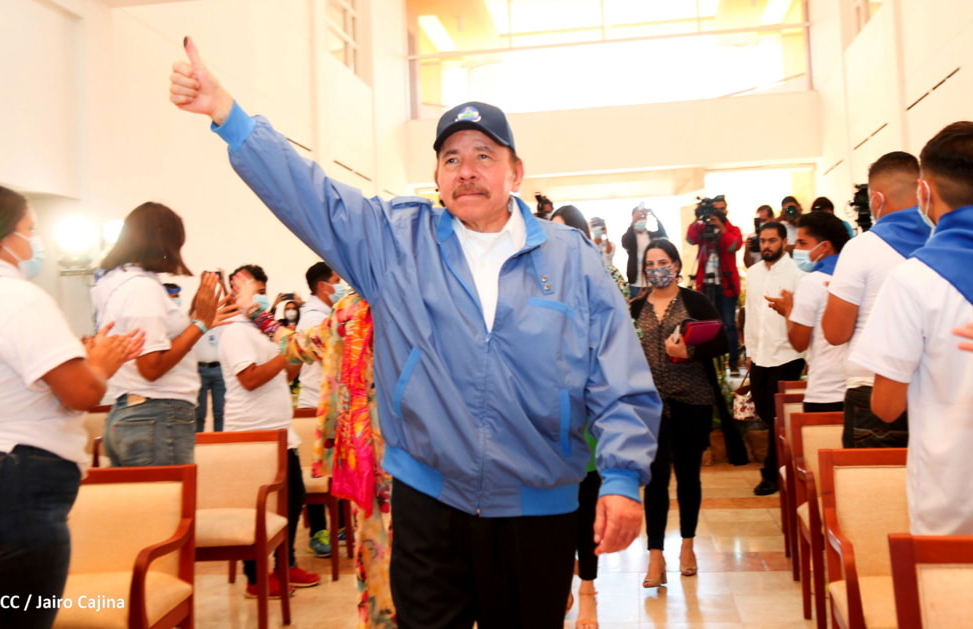Nicaraguan President Daniel Ortega is set to win a fourth consecutive term in office. The preliminary results of the general elections held in the Central American country on Sunday, November 7 gave a huge advantage to the incumbent president. According to the results announced by the Supreme Electoral Council (CSE), in the early hours of November 8, with 49.25% of the votes counted so far, president Ortega obtained 74.99% of the votes.
Following Ortega, in second place, is Wálter Espinoza of the Constitutionalist Liberal Party (PLC) with 14.40% of the votes. Meanwhile, the other four candidates are closely competing with each other.
— Consejo Supremo Electoral de Nicaragua 🇳🇮 (@cse_nicaragua) November 8, 2021
Despite the attempts by the US government and the EU to discredit the elections, and their refusal to recognize the results, Sunday’s polls were carried out peacefully and without any serious incidents. Hundreds of international election observers from dozens of countries verified the reliability and stability of the democratic process.
The New York Times is claiming they are “closing voting stations in mass” in #Nicaragua
That’s just a lie.
I’m here & team is on the ground in different parts of the country. Election is smooth & tranquil. pic.twitter.com/hq9H1KILFE
— Caleb T. Maupin (@calebmaupin) November 7, 2021
Around 4.5 million Nicaraguans were eligible to vote and elect the country’s next president, vice-president, 90 legislators, and 20 representatives to the Central American Parliament (PARLACEN). The elections were marked by a fairly high turnout.
The president of the CSE, Brenda Rocha, reported that 65.34% of the registered voters participated in the elections. Rocha further reported that the preliminary results of the legislative and PARLACEN elections would be released on Monday afternoon.
#EleccionesSoberanas2021 🇳🇮 | Familias nicaragüenses continúan acudiendo a Centros de Votación del país a ejercer su derecho al voto 🗳 Libre, Justo, Transparente y en Paz 🕊
1/2 pic.twitter.com/uf85Bf0EdX— Consejo Supremo Electoral de Nicaragua 🇳🇮 (@cse_nicaragua) November 7, 2021
With these election results, the people of Nicaragua reiterated their rejection of the lies spread about the country by the imperialist powers. Despite the suffocating sanctions imposed as coercive measures, the people expressed their overwhelming support for the left-wing government of the ruling Sandinista National Liberation Front (FSLN) party.
Many welcomed the continuity of social programs promoted and created during the 14 years of the FSLN government, as well as the advances made by the country in the fields of healthcare, education, infrastructure, food sovereignty and gender equality since 2007.
Immediately following the closing of the polls on Sunday, US president Joe Biden issued a statement calling the process a “sham” and stating that the “pantomime election … was neither free nor fair, and most certainly not democratic”. He concluded stating that the US “will use all diplomatic and economic tools at our disposal to support the people of Nicaragua and hold accountable the Ortega-Murillo government and those that facilitate its abuses.”
Growth under Sandinismo
Just ahead of the elections on November 6, various government officials held a meeting with international observers and presented the achievements reached in the health, education, and economic sectors. Health minister Martha Reyes shared that the country had successfully vaccinated over 95% of its population against 16 diseases. She also reported that 52% of the population above the age of two have already received a dose of anti-COVID-19 vaccines despite the commercial, economic and financial blockade against the country.
Reyes recalled that in 1977, the country had only 209 health centers and said that by the end of 2021, the figure is expected to reach 1,566 centers. At the same time, she reported that infant mortality in the country decreased by 56%, neonatal mortality decreased by 50% and chronic child malnutrition reduced by over 50% by the end of 2020 in comparison to 2006. She also reported that maternal mortality also significantly reduced.
Meanwhile, the minister advisor for education, Salvador Vanegas, highlighted that president Ortega decreed free and universal education the day he took office in 2007.
The president of the Central Bank of Nicaragua (BCN), Ovidio Reyes, recalled that since 2018, the country’s economy has been affected, first by the failed coup attempt, later due to COVID-19 pandemic and then due to hurricanes Iota and Eta. However, he stressed that Nicaragua is working to mitigate its impact.
He predicted that the country’s economy is expected to grow between 6% and 8% and reported that the country’s GDP grew by 3.8% in the first quarter of this year and by 16.7% in the second.
According to him, the main factor of growth has been exports that rose to 43.6%, in addition to the recovery of the construction sector, commerce and the manufacturing industry. He added that the most important investment sectors have been renewable energy sectors, manufacturing in free zones, mining, tobacco, telecommunications, finance, commerce and agriculture.





